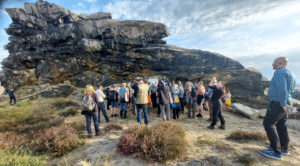
Terrestrial Processes, Deposits & History (TERPRO)
TERrestrial PROcesses, Deposits & History (TERPRO)
TERPRO promotes and supports research on Quaternary topics related to terrestrial environments including surface and tectonic processes, especially in areas that investigate new frontiers in science and incorporate multiple and cross-disciplinary research efforts, multi-national research and involve developing countries.
The TERPRO Commission supports the development of research projects, and the establishment of scientific networks focused on investigating Quaternary continental environments, processes, and tectonics. TERPRO also encourages the development of strategies to mitigate the social impacts of natural hazards (e.g., active tectonics, environmental effects of earthquakes, extreme climatic events, desertification, flooding) by studying the Quaternary record and fostering dialogue with stakeholders.
This commission promotes effective communication and serves as a valuable platform for international scientific collaboration in fields such as paleoseismology, archaeoseismology, geomorphology, glaciology, hydrology, dust studies, and paleopedology. It spans the broader spectrum of Quaternary disciplines, coordinating several research projects and working groups with a strong interdisciplinary approach. The TERPRO community actively advocates for new field observations in critical regions or areas where significant gaps exist in the understanding of Quaternary terrestrial processes.
Mission
Its mission includes engaging young scientists from around the globe. One of the commission’s key objectives is to bring together specialists at scientific events organized within its projects and working groups, with a particular focus on enhancing participation from under-represented groups and countries. These events create opportunities for researchers from diverse backgrounds to meet, interact, exchange data and interpretations, and discuss shared methodologies, aiming for integrated outcomes, especially in the analysis of natural hazards.
Projects
TERPRO related Events
TERPRO

TERPRO President
Andrea Zerboni
Università Degli Studi Di Milano, Via L. Mangiagalli 34, I-20133 Milano - Ital

Vice President
Petra Štĕpančíková
Institute Of Rock Structure And Mechanics Of The Czech Academy Of Sciences, Prague, Czech Republic



Advisory Board Member
Klaus Reicherter
RWTH Aachen University, Aachen, GermanyAdvisory Board Member
Elizabeth Solleiro Rebolledo
Universidad Nacional Autónoma De México (UNAM), Mexico

Advisory Board Member
Alessandro Michetti
Universita Dell'Insubria, Como, ItalyAdvisory Board Member
Young-Seog Kim
Pukyong National University, Busan, South KoreaAdvisory Board Member
Yehouda Enzel
Hebrew University Of Jerusalem, Jerusalem, IsraelAdvisory Board Member
Dioni Cendon
Australian Nuclear Science And Technology Organization, Kirrawee DC, Australia Loess Fest 2026
Loess Fest 2026Echoes of the past: Loess, climate and human interactions during the Pleistocene will take place between 7-11 September in Krapets, Bulgaria
 Podcast INQUA India 2027
Podcast INQUA India 2027Quaternary is the age when modern recognisable humans started inhabiting this planet. All over the world scientists are engaged in studying various aspects of human evolution. Once every 4 years scientists from all across the…
 PALCOM-supported sessions
PALCOM-supported sessionsINQUA PALCOM interactive bulletin of scientific sessions for the INQUA Congress 2027
 New QP Issue Out!
New QP Issue Out!QP Issue 39 December 2025 is now available online!
 INQUA 2025 Sir Nicholas Shackleton Medal
INQUA 2025 Sir Nicholas Shackleton MedalThe INQUA 2025 Sir Nicholas Shackleton Medal recipient is Prof. Dr. Nicole Khan from the University of Hong Kong (Hong Kong)
 7th International Palaeontological Congress – IPC7
7th International Palaeontological Congress – IPC7The 7th International Palaeontological Congress (IPC7) will be held between 30 November – 3 December 2026 in Cape Town, South Africa
Scientific Journals

